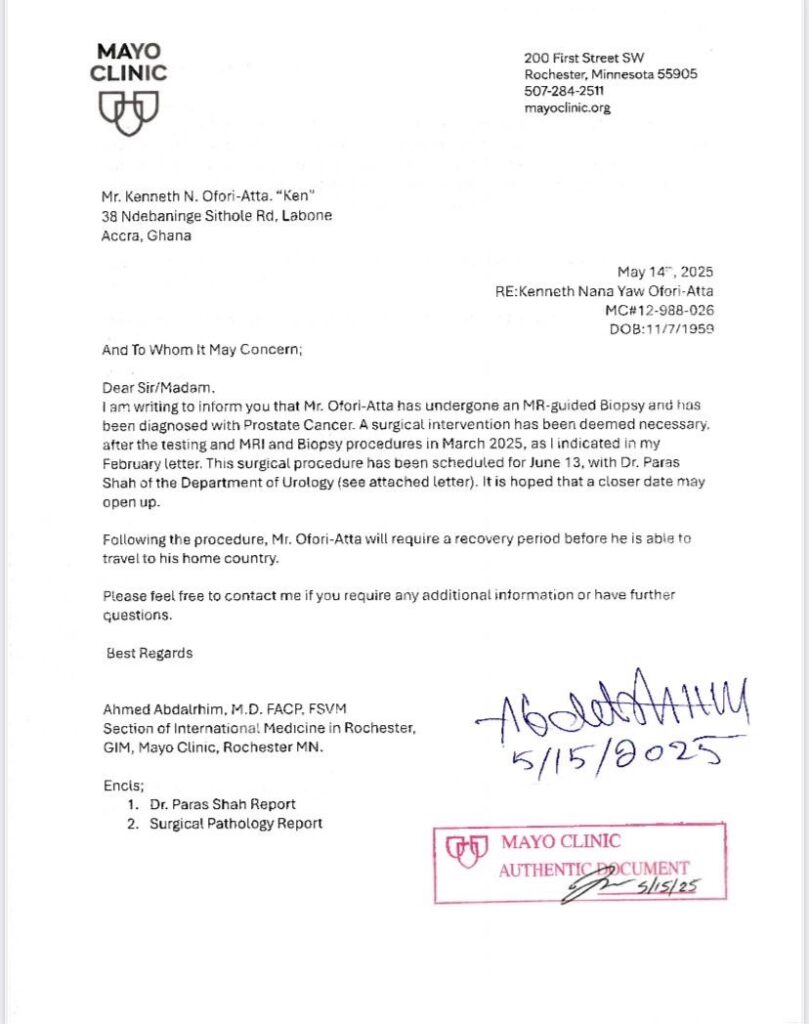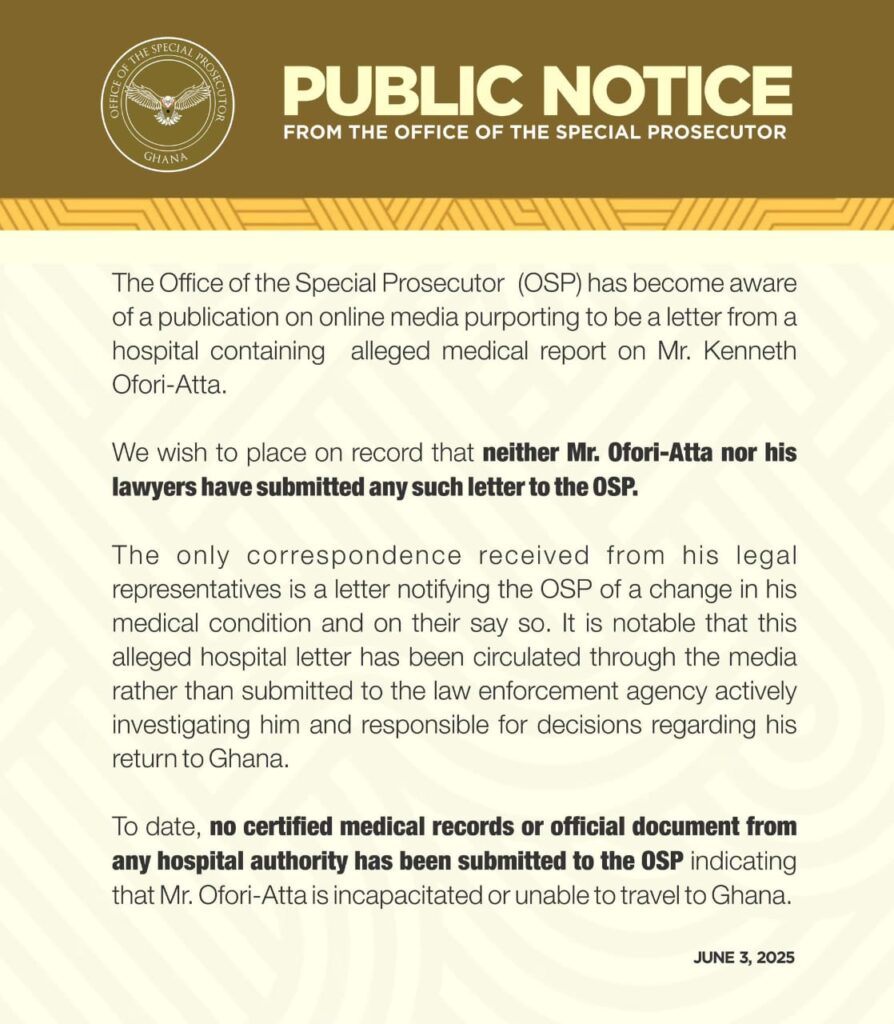The unfolding legal and political controversy involving Ghana’s former Finance Minister, Ken Ofori-Atta, has taken a new dimension following an official communique from the Mayo Clinic in Rochester, Minnesota, confirming his diagnosis with prostate cancer. The communique, issued on June 3, 2025, verifies that Mr. Ofori-Atta is scheduled to undergo surgical intervention on June 13, 2025, thereby substantiating earlier reports that had been dismissed by the Office of the Special Prosecutor (OSP) as unofficial.
The Mayo Clinic’s confirmation follows the circulation of a letter purportedly authored by Dr. Ahmed Abdalrhim, an internal medicine specialist at the prestigious medical institution. The initial report, dated May 14, 2025, stated that Mr. Ofori-Atta had been diagnosed with clinically significant adenocarcinoma of the prostate and had been advised to undergo immediate surgery. Until the official communique from the hospital, the letter had remained a subject of public skepticism and institutional scrutiny.

The OSP, in a public release dated June 3, declared that it had not received any authenticated or official medical records from Mr. Ofori-Atta or his legal representatives. It described the circulating document as unofficial and underscored that it had only received a letter from Mr. Ofori-Atta’s legal team referencing a change in his medical condition, without any corroborating medical documentation.

“The Office of the Special Prosecutor has not been served with any formal or verified medical records from a recognized institution confirming Mr. Ofori-Atta’s health status,” the OSP emphasized. “The conduct of distributing purported medical information through media channels rather than proper legal pathways raises questions of propriety and credibility.”
However, with the Mayo Clinic now formally confirming the contents of the original letter, the narrative has shifted significantly. The confirmation raises complex questions regarding the balance between due legal process and the imperative to consider legitimate medical exigencies within ongoing judicial and investigative procedures.
The situation is further complicated by the fact that Mr. Ofori-Atta has once again been placed on the OSP’s wanted list following his failure to report to the Special Prosecutor’s office on the stipulated date of June 2. The OSP has also indicated that it is initiating an INTERPOL Red Notice to effect his arrest and extradition if necessary.
This move comes in the context of a broader investigation into multiple allegations of corruption, procurement irregularities, and financial impropriety during Mr. Ofori-Atta’s tenure as Finance Minister. The allegations involve high-profile matters, including the controversial revenue assurance contract between the Ghana Revenue Authority and Strategic Mobilisation Ghana Ltd, the cancellation of a contract with Beijing Xiaocheng Company (BXC), and issues surrounding the procurement processes related to the construction of the National Cathedral.
The confirmation of Mr. Ofori-Atta’s medical condition by the Mayo Clinic introduces an additional layer of complexity, particularly in legal and human rights terms. Legal scholars and health law experts are already debating the extent to which the confirmed diagnosis should alter the course of the investigative process or delay Mr. Ofori-Atta’s appearance before the OSP.
Dr. Kwabena Mensah, a constitutional law expert at the University of Ghana School of Law, observed: “Medical incapacity, when proven, is a legitimate ground for procedural adjustment. However, the key issue is whether the medical condition genuinely impedes the suspect’s ability to participate in an investigation, or whether it is being used intentionally or not, to delay accountability.”
He added that now that the Mayo Clinic has issued an official communique, the OSP may be obliged to reconsider the timeline or establish a medical liaison to verify the extent to which the condition affects Mr. Ofori-Atta’s legal obligations.
The OSP’s posture thus far has been firm. In rejecting earlier appeals by Mr. Ofori-Atta’s team to conduct a virtual interrogation, Special Prosecutor Kissi Agyebeng maintained that no suspect under criminal investigation has the legal authority to dictate the terms of their cooperation. “Justice must not bow to convenience,” he said, adding that “selective accountability compromises the foundation of democratic governance.”
Civil society organizations have continued to monitor the situation closely. The Ghana Anti-Corruption Coalition, in a statement issued Monday, urged all parties to adhere strictly to principles of transparency, due process, and respect for human dignity.
“While the law must be applied fairly and without fear or favour, health-related issues must be handled with sensitivity and objectivity,” the Coalition stated. “We urge the OSP to assess this latest development carefully, while also encouraging Mr. Ofori-Atta and his legal team to maintain full cooperation with the legal process.”
Public sentiment remains sharply divided. While some members of the public have expressed compassion and called for a postponement of investigative procedures on humanitarian grounds, others remain skeptical, suggesting that the medical developments are conveniently timed to derail a legitimate corruption probe.
As at now, the OSP has not yet issued a new statement in response to the Mayo Clinic’s confirmation. Legal observers expect that a formal medical submission from Mr. Ofori-Atta’s legal counsel, backed by the hospital’s communique, will likely trigger a reassessment of the OSP’s approach in the coming days.
Until then, Mr. Ofori-Atta remains the subject of an active INTERPOL Red Notice process, underscoring the seriousness of the allegations and the national imperative to uphold institutional accountability.

